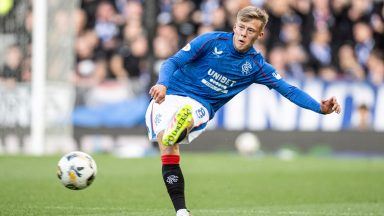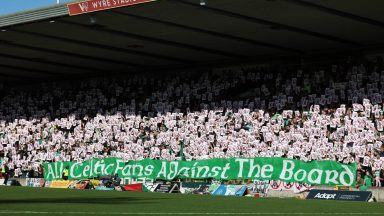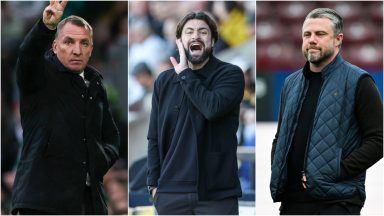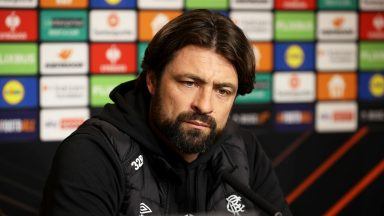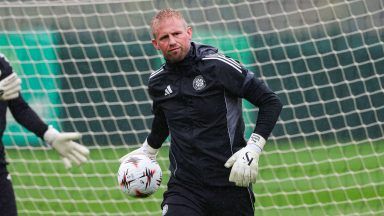“It’s a weird league,” Ange Postecoglou said. “You like to call things early here, don’t you?”
That was early last season when Celtic had kicked off their league campaign with defeat to Hearts, lost to Rangers and Livingston and drawn at home to Dundee United, all in their first seven Premiership games.
What followed is well-documented: a remarkable turnaround as a much-changed team gelled, adapted to a fresh style under a new manager and clinched the title with a game to spare.
Postecoglou’s point was made, those who had written his team off before the clocks had changed were made to look a little foolish and premature.
This time around, calling it early carried little of the same risk as Celtic relentlessly pursued their goal, sitting top of the league after the first round of matches, five points ahead after half a dozen games, nine clear of their nearest rivals at the winter break and 12 clear going into the game that clinched the title.
Postecoglou’s second season has cemented Celtic’s place as the dominant force in the league.
Summer transfers and continuity kept

The title defence began not on the park but in the transfer market, though last summer’s business was a different affair from the mass clear-out and recruitment of twelve months previously.
Instead, the ins and outs at Celtic Park felt more like a tidying-up exercise, loose ends being taken care of to complete the reshaping of the squad.
The compulsory purchase of Japan international Daizen Maeda was completed as again Celtic got their major business done early.
Cameron Carter-Vickers and Jota had been stand-out performers at opposite ends of the park while on loan in Postecoglou’s first season. Both were secured as permanent signings, marking the major outlay in transfer fees but also guaranteeing the continued presence of Carter-Vickers as a rock in the heart of the defence, and Jota as a key part of the energy and flair in attack.
Remnants of the previous era all left the Lennoxtown training base, with Vasilis Barkas, Ismaila Soro, Boli Bolingoli, Albion Ajeti, Nir Bitton and Tom Rogic all packing their bags.
Rogic was perhaps the only surprise departure but where one experienced Australian international left, another arrived, with Aaron Mooy joining on a free and proving to be one of the most eye-catching signings of the season with know-how he brought to the midfield.
Benjamin Siegrist joined as back-up goalkeeper, Alexandro Bernabei was brought in to challenge Greg Taylor at left-back and Sead Haksabanovic was added to the attacking options. Even early in the summer, Celtic looked equipped for success.
Moritz Jenz and Oliver Abildgaard were also brought to the club, though their exits the following January marked them out as rare transfer market misfires.
Strong start with Premiership hit for six

There was to be no repeat of the misfiring start to the previous season as Postecoglou’s side made an early statement of intent.
A header from Steven Welsh and a stunner from Jota sealed a flag day win over Aberdeen to get things started and that was followed by back-to-back away wins at Ross County and Kilmarnock buy scorelines of 3-1 and 5-0. Hearts were defeated 2-0 in Glasgow before a headline-grabbing 9-0 demolition of Dundee United at Tannadice. That set things up for the first derby of the season as Rangers were welcomed to Celtic Park.
Liel Abada scored twice and Jota found the net before half time, then David Turnbull rounded off the scoring as Celtic ran out 4-0 winners and emphasised who was in the ascendancy in Glasgow.
Six games in the defending champions had maximum points but had only conceded one goal while finding the net no less than 29 times.
That made what happened next all the more remarkable, as a well-drilled and confident St Mirren side sprang an upset in Paisley with a 2-0 win and marking the only L in Celtic’s league record this season.
After the final whistle in that game, Postecoglou complimented St Mirren but also noted that his players hadn’t won anything yet and that “football will always keep you in check if you aren’t doing things the right way”. He was looking for a response from his side and he got it as the team immediately embarked on another run.
From that point, there were eight Premiership games to play before the World Cup-shaped break in the campaign and eight wins were delivered. Hibernian were hit for six, Hearts were beaten 4-3 in a thriller at Tynecastle as the winning habit continued
After signing off with a 2-1 win over Ross County, Celtic could look at a nine-point lead in the table as the Premiership paused.
Fresh challenge from Ibrox met with unbeatable form

Celtic’s commanding form in the first 15 games had come as they looked to match their own standards, but without a rival breathing down their neck and posing a serious threat to their position. Aberdeen sat in third and had shown improvement under Jim Goodwin but weren’t able to put together any kind of consistent form. Hearts were struggling, partly through a series of injuries and the demands of European group stage football, and were nowhere near.
On the south side of Glasgow, Rangers were struggling. Europa League finalists only months before, Giovanni van Bronckhorst’s team had dropped points in five out of 15 league games, set an unwanted Champions League record in their six group stage losses and generally looked a shadow of the side that had played their way to Seville. That prompted a change in the dugout and Michael Beale arrived with the intent of posing fresh questions to Postecoglou and Celtic.
Beale delivered what was asked of him in the first games after the break, with his side returning maximum points from the four matches between the World Cup and the end of the year. With Celtic matching that tally as they settled back into action with ease, it set up an intriguing second Old Firm match of the season at Ibrox on January 2.
Daizen Maeda pounced on a mistake to put Celtic ahead after just five minutes but Rangers showed their new-found confidence by equalising through Ryan Kent and then edging ahead when James Tavernier buried a penalty past Joe Hart.
As the clock ticked down at Ibrox, some might have been wondering if there was indeed life in the title race, and if a real challenge might expose weakness in Celtic. Instead, two minutes from time, Kyogo Furuhashi pounced in the box as the Rangers defence was in disarray and Celtic earned a point. The gap at the top was maintained, the momentum from Beale’s side was checked, and the odds on the title remaining in the east end shortened even further.
Celtic saw out January with league wins over Kilmarnock, St Mirren and Dundee United. Eight goals scored, none conceded. The transfer window brought another challenge that was met. Josip Juranovic impressed at the World Cup and was sold to Union Berlin but Canada international Alistair Johnston had been bought in anticipation of the Croatian moving on and slotted in seamlessly at right-back. Giorgos Giakoumakis departed for MLS, South Korean striker Oh Hyuen-Gyu had been brought in to take his place and the prolific Greek striker’s absence was barely noted.
Relentless run demonstrates champions’ credentials

Rangers’ unbeaten league run under Beale had continued and their upturn in form only served to underscore how Celtic maintained a standard that was untouchable through the middle stretch of the Premiership season.
From Beale’s arrival in November until the start of April, Rangers won 14 of 15 games and drew the other but stayed in second place and remained nine points off top. Not only did Celtic maintain their breakneck pace towards the title as competition intensified, they increased the gap in goal difference by 14 goals in that spell.
That took the defending champions and their rivals into another Glasgow showdown at Celtic Park on April 8. For Rangers, it was realistically a last chance to put any pressure on and cut the gap.
It was Kyogo who put Celtic in front, continuing a goal-laden season that’s already seeing comparisons made with Henrik Larsson. Rangers’ own talisman, captain James Tavernier, levelled with a superb free-kick just before the break. Kyogo restored Celtic’s lead before Jota doubled it. Tavernier scored again to make it 3-2 but Rangers had no further response.
Beale had suffered his first defeat and Rangers spoke about the fine margins that separated the sides. For Celtic, the only margin that mattered was the one at the top of the table: a 12-point, all but insurmountable, gap.
From that point, it was all about calculation when, not if, the title would be won. A victory at Kilmarnock brought confirmation closer but a surprise home draw with Motherwell meant the coronation was lined up for May 7 at Tynecastle.
With Hearts under the management of Steven Naismith, a determined obstacle was in Celtic’s path as they closed in on their goal and the Gorgie side had their chances to spoil the party early on but couldn’t take them. The dismissal of Alex Cochrane put things in Celtic’s favour but the visitors were still struggling to impose themselves fully on the game and bring their goal threat to bear on the ten-man opposition.
As has been the case all season, the razor-sharp attack couldn’t be denied. A defence-splitting pass from Callum McGregor set Reo Hatate free and his pass was met by Kyogo, who applied a characteristically clinical one-touch finish to guide the ball into the bottom corner.
Sitting back on a one-goal lead hadn’t been Celtic’s style all season long and it didn’t change with the title on the line, the team continuing to push for goals and getting their reward. Substitutes Sead Haksabanovic and Aaron Mooy combined to make a chance from the left and Oh, also off the bench, burst into the six yard box to finish.
Celtic had been ahead and pulled further away from their opposition with an attack there was no stopping. Story of the game and story of the season.
What next for the Premiership champions?

With the League Cup triumph earlier in the season meaning a historic treble is on the line when Celtic face Inverness in the Scottish Cup final, woe betide anyone who suggests to Ange Postecoglou that his team might take their foot off the gas now the title is secure.
Even apart from the competition for places, and wish to maintain winning form, ahead of that Hampden showpiece, there is still further polish that can be put on the Premiership trophy success.
The record for most wins in a Premiership season stands at 34, and a flawless end to the season would see the team surpass that. The goals record, set by the ‘Invincibles’ Celtic team in 2016-17, will likely be smashed by a team that has scored four goals or more 13 times this league campaign.
Also on the horizon is the record points total of 106, again set by the Invincibles and also needing a perfect end to the campaign to be broken.
Four more wins, starting with a victory at Ibrox next week, would see Celtic reach 107 and add another bit of gloss to an impressive campaign.
The title may have been won, but it’s unlikely Celtic will call things early with prizes still to be earned.
Follow STV News on WhatsApp
Scan the QR code on your mobile device for all the latest news from around the country


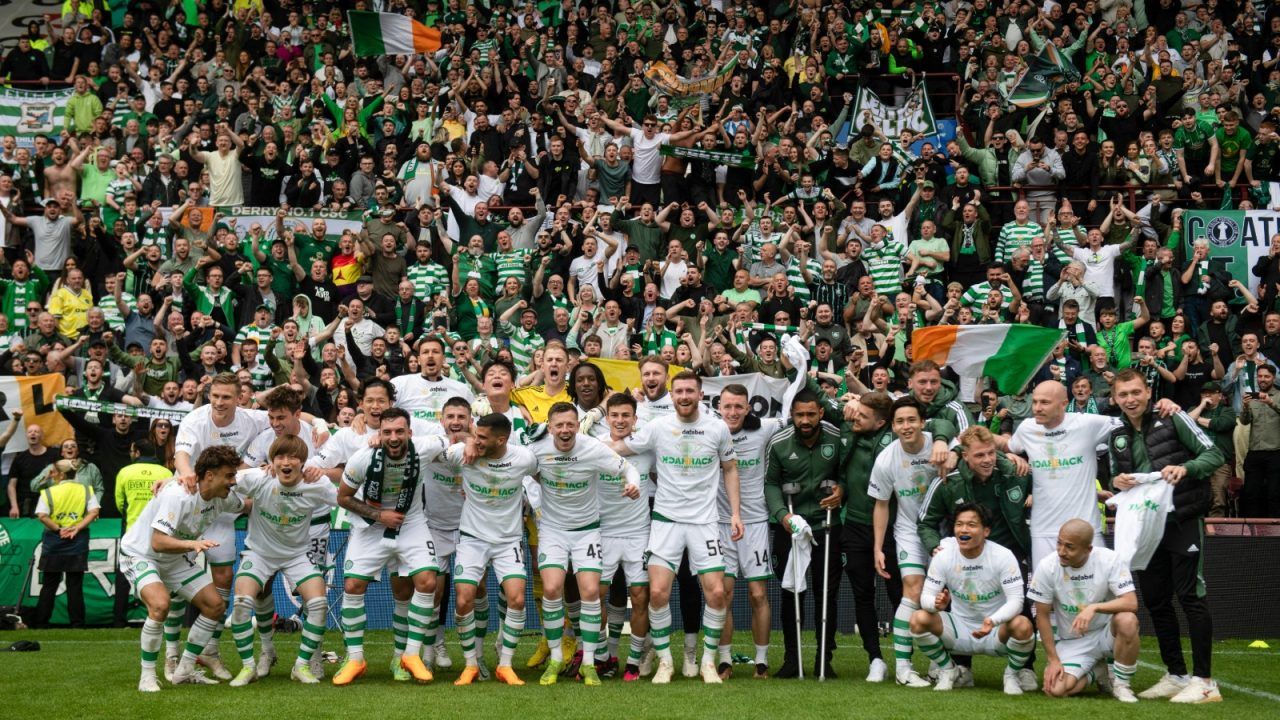 SNS Group
SNS Group

















